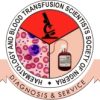Saeed S. A. Maryam I.R. Udomah F.P. Oduola, T. Alhassan H.M. Ahmad A.E. Muhammad Y. Armiyau A.Y. Aminu Y and Adamu M.B.
AJLHTS: Original Paper DOI – https://www.ajlhtsonline.org/doi-org-10-59708-ajlhts-v2i3-2322/
Abstract
Background: von Willebrand Factor and factor VIII have been
implicated in the vulnerability of causing hypertension which
is related/common to some of the ABO blood group antigens.
However, the precise mechanism/role of the von Willebrand
Factor and factor VIII in hypertension is unknown. The study is a
comparative study that is aimed to determine the association of ABO
red cell antigen, von Willebrand factor, Factor VIII, and Platelets
among hypertensive patients in Kaduna, Nigeria.
Methods: To determine this association, fifty-five (55) hypertensive
patients and 28 controls were recruited. A purposive sampling
technique was employed in selecting the study participants.
Determination of the ABO blood group, vWF, FVIII, and platelets
was carried out to establish the frequency and the association of
ABO blood type with hypertension.
Results: It was established that blood group O (43%) has the highest
distribution followed by A, B, and AB (6%) the least. There was no
significant difference in vWF(ng/L), FVIII(pg/ml), and platelet
count(109/l) between the patients and the controls (454.9 and
456.2), (242.0 and 228.4) and (238.0 and 213.0) respectively, p>0.05.
The correlation studies showed a strong association between vWF
and FVIII (r – 0.544, P<0.0001). There was a significant difference
between males’ and females’ vWF and FVIII (P=0.0013 and 0.0029
respectively), indicating females had a higher level of vWF and
FVIII, and therefore at higher risk of developing hypertension.
Women should therefore be screened for these parameters as a
matter of routine.
Conclusion: The risk of developing hypertension based on the
parameters considered in this study is independent of the ABO
blood group of an individual. There is a need for further studies, to
confirm or rule out these findings.

